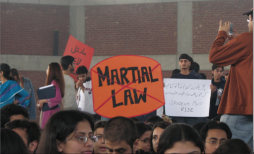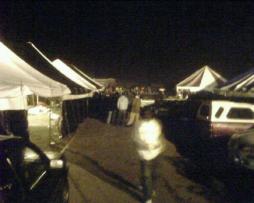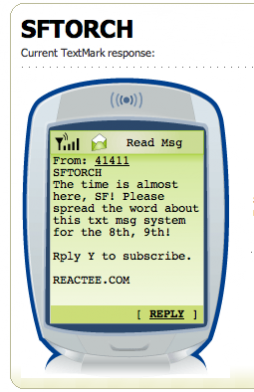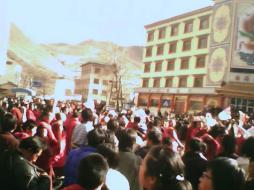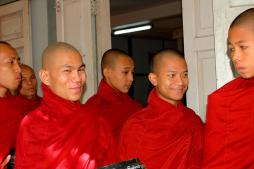Peace, War, and Conflict Resolution
Posted by KatrinVerclas on Mar 30, 2009
In early 2008 violence errupted in Kenya after the most recent elections there the previous December. Post-election tribal warfare resulted in the death of 1,200 people, internally displaced 400,000 to 600,000 people, and destroyed more than 41,000 properties. The economic cost of the crisis has been estimated at more than KSh 100 billion (approx US $ 1.5 billion), with more than half a milion jobs lost. The World Bank noted that over 2 million Kenyans may have been driven into poverty as a result of the violence. Food security also declined with farmers unable to cultivate and harvest their farms in early 2008.
Posted by KatrinVerclas on Feb 05, 2009
On November 3, 2007 Pakistan's President Musharraf declared a state of emergency and martial law in Pakistan, suspending the Pakistan constitution. During the next three months, during the short-lived emergency rule, Bhutto's assassination, and the general election in February of 2008, there was an unprecedented outpouring of citizen media, organizing and information sharing facilitated by new media -- blogging, mobile phones, and online video.
Huma Yusuf, an astute and eloquent journalist based in Karachi, has reported now on the convergence of old and new media during the 'Pakistan emergency,' as it is most often referred to in the country. It is a must-read document for anyone interested in citizen media, particularly in times of political turmoil, for the wealth of insights it provides on the current uses of digital media and the opportunities for future work in this area.
Posted by KatrinVerclas on Dec 31, 2008
Some people are claiming that the conflict in Gaza is a "social war." But so far, social media is used mainly for propaganda and there is a marked absence of voices from people affected by the conflict, and of useful applications of mobile and other social media. As the Israeli bombing of Gaza is continuing and is now in its third day, mobile communication is beginning to make the news but is not playing the dominant role in citizen reporting and aid communications as it has in other conflicts.
A few examples that have not been reported anywhere else: Souktel, an organization in Ramallah that is known for its SMS-job matching service connecting Palestine youth with work, is running a Palestinian "SMS Blood Bank" program for the Red Crescent.
Posted by KatrinVerclas on Nov 27, 2008
UPDATED POST: Mobiles are yet again playing a key role in citizen reporting as terror attacks grip the Indian city of Mumbai. Twitter, the microblogging service that is available in India, was especially instrumental in conveying first hand reports as the chaotic events were unfolding in the city. Twitter users set up aggregator accounts at Mumbai, Bombay, @BreakingNews and with the search tag #Mumbai.
Posted by KatrinVerclas on May 26, 2008
I am in South Africa this week as violence against immigrants broke out in townships all over the country. There are several initiatives that have now been launched to combat the violence -- using mobile phones.
In response to the violence against foreigners, the Western Cape Emergency Task Team with the leadership of Peter Benjamin of Cell-Life, has activated a national SMS emergency system for citizens to respond to the violence. The Task Team, a coalition of South Africa's Treatment Action Campaign (TAC) and over 20 NGOs, has activated “NO TO XENOPHOBIA” SMS lines across South Africa.
Posted by KatrinVerclas on Apr 10, 2008
An early-morning group text message from SFTorch on txtmarks.com by protest organizers in San Francisco read: "Good morning, what a beautiful day! Default meeting place is Ferry Park, 8 am." Throughout the day, text messages to more than 1,300 people were disseminated by protesters, using Txtmark, a free group messaging system. Thousands of Tibetan exiles and supporters protested the Olympic torch relay throughout the day, forcing the torch route to be changed a number of times.
The Twitter group SFTorch was much smaller with some 200 followers by mid-day and used to report up-to date messages to audiences both in San Francisco and elsewhere. The security prompted messages on Twitter such as this one: "I have never ever seen this much security for an inanimate object" and ""It ain't coming here." --Guy behind me "It's going up and down Van Ness, and nobody is there to see it." --Girl beside me."
Posted by KatrinVerclas on Mar 16, 2008
Pictures and video out of Lhasa and Xiahe are slowly emerging, yet again initially mainly taken with camera phones and transmitted clandestinely across the border to transmit to a global audience.
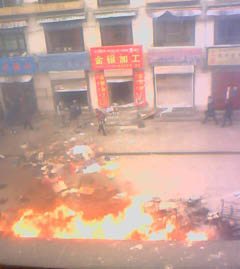
According to reports, mobile networks and Internet access have been restricted for the last few days. Anti-Chinese protests led by Buddhist monks spread to other cities after a violent crackdown by Chinese troups on Friday that may have left as many as 100 protesters dead. Protests began peacefully last Monday but turned violent yesterday. Human Rights Watch alleged Chinese security forces "beating protesters, firing live ammunition and surrounding the Ganden Drepung and Sera monasteries."
Tibet has been occupied by China since 1950.
Update: From Chinese Twitter clones, comments about Tibet.
Images courtesy of Tibetan Center for Human Rights
Posted by CorinneRamey on Nov 21, 2007
In the United States this Thanksgiving holiday, Americans can send an SMS to support military men and women serving around the world as part of the America Supports You (ASY) campaign. ASY, a program of the U.S. Department of Defense, allows mobile users to send an SMS to short code 89-279 (TX ASY) with a message of support or thanks for military troops. The program, "recognizes citizens' support for military men and women and communicates that support to members of our Armed Forces at home and abroad."
While initially intended to promote an exchange of messages from troops abroad to the senders, the DOD yesterday abruptly changed the program and now sends back only prepared thank-you messages rather than live messages from troops aborad.
Posted by KatrinVerclas on Nov 16, 2007
Guest writer Babar Bhatti from State of Telecom Industry in Pakistan writes about SMS and mobile use for organizing in the recent turmoil in Pakistan:
Posted by KatrinVerclas on Nov 07, 2007
I interviewed Paul Currion for a research project for the UN Foundation and Vodafone Group Foundation that will be released next year. I asked him about the "state of affairs" of using mobile phones in disaster relief work and humanitarian emergencies. Veritable blogger that he is, he summarized his thoughts on his blog and gave permission to cross-post here.
"I just had an interesting conversation with Katrin Verclas of Mobileactive, who is doing some research into cellphone use in different sectors, and in the course of our discussion a few points emerged about how cellphones are being used in the humanitarian sector.
Posted by CorinneRamey on Sep 25, 2007
Thousands of monks have taken to the streets in Myanmar within the past month in pro-democracy demonstrations. Today the Burmese government threatened the monks with legal action.
The government has shut down mobile phone service to pro-democracy supporters, activists, and some foreign journalists, writes the Agence France-Presse. A journalist and photographer from the AFP are among those who have lost phone service, and the agency has requested that Myanmar restore service to the journalists. The National League for Democracy also reports that its landline phone has been cut off, according to this article in The Economic Times.
Posted by on Jan 01, 1970
n/a
